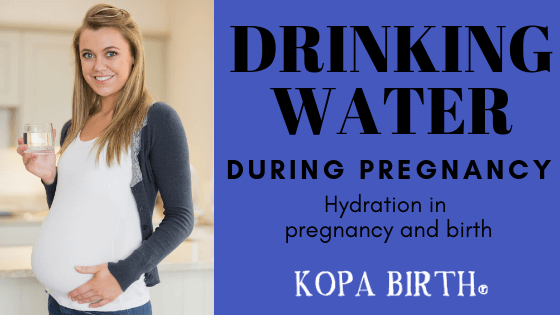
Among the piles of advice that come your way when you’re expecting, you often hear about staying hydrated. Is this really as important as things like nutrition and exercise? Let’s take a look at why drinking water during pregnancy is important for you and your baby.
Estimated reading time: 5 minutes
Our cells are made of more water than anything else. Up to 60% of the adult body is water, and a newborn baby’s body is about 78% water (1)! Chemical reactions in the cells throughout your entire body require water. The pregnant body is working hard to create new life, and it requires the support of plenty of water to keep everything running smoothly. Let’s look at some functions of this hardworking, underrated liquid.
And to learn more about water in your body, check out this article from the USGS: The Water in You: Water and the Human Body
Drinking water during pregnancy is important because fluids help deliver nutrients to your growing baby (2). If you don’t drink enough fluids and become dehydrated, your blood may thicken which can make it harder to pass nutrients to your little one. Ultimately, dehydration may reduce the amount of nutrients baby receives from you (3).
Your body produces many more blood cells during pregnancy than when you’re not pregnant. In fact, your blood volume increases by 50% during pregnancy (3). Your body needs water to produce this additional blood volume.
Drinking enough water also helps your body to form the amniotic fluid that surrounds your baby. This protective fluid is vital to a healthy pregnancy.
Your body needs water to flush out toxins and waste (4). When you’re pregnant, you’re not only clearing out your own body’s toxins and waste products, but also your baby’s. You need to have enough fluid in your body to properly circulate waste products and remove them from your body.
Drinking water can help ease or avoid some of the difficult symptoms of pregnancy. Staying hydrated can help:
So, how much water do you actually need to drink each day to stay optimally hydrated? The American Pregnancy Society recommends at least 8 to 12 glasses of water a day. It might seem intimidating — even impossible — to drink 8 or more glasses of water a day. But keep in mind that these guidelines are for 8 ounce glasses. An average drinking glass is more like 12 – 16 ounces. If you use a 16 ounce glass, or an average bottle of water which is around 16 ounces, you need 4 to 6 glasses or bottles in a day. You can do that! Ultimately, you should aim for 64 to 96 ounces of water daily.
You may find it difficult to drink enough, especially if you’re not used to doing so. It may help to develop a routine. You might plan a glass with each meal, one mid-morning, and one in the afternoon. Also remember that you don’t have to choke it down as plain water. You can:
The best way to keep track of whether or not you’re drinking enough is to take notice of the color of your urine. Urine should be clear or very light yellow. Medium or dark yellow urine is a sign that you need to increase your fluid intake.
Drinking water during pregnancy is important, but it’s also important that you are hydrated as you head into labor and delivery. In fact, staying hydrated may help prevent preterm labor, as dehydration can contribute to preterm labor.
It’s no secret that labor and delivery are hard work! Your body works its best when adequately hydrated. If you’re a runner, someone who plays sports, or a person who exercises regularly, you likely are intentional in your fluid intake so that you can perform at your peak. Labor should be approached in the same way. Your body will work hard for a prolonged time, and you will feel your best if you go into this marathon with adequate hydration.
It’s important to go into labor with plenty of water already in your body to help carry you through. It can be hard to drink enough once labor has started. Some women feel nauseated or don’t really want food or drink during contractions. And your body will be working so hard that drinking to keep up with what you’re losing is a much easier goal than trying to overcome dehydration.
Some interventions require that a woman not drink while laboring. The ability to keep drinking in labor may be another great reason to consider a natural birth. But if you’re even considering that you may use an epidural, you should know that you will likely not be able to eat or drink. You will have an IV that delivers hydration, but that does little to ease a dry mouth or parched throat.
What are you waiting for? It’s time to start chugging that water!!
References:
Among the piles of advice that come your way when you’re expecting, you often hear about staying hydrated. Is this really as important as things like nutrition and exercise? Let’s